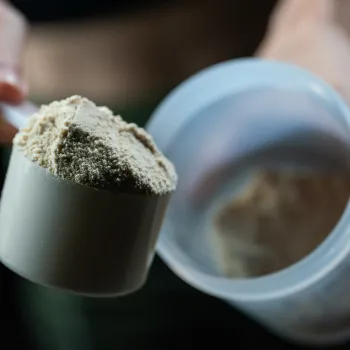Throughout my career as a coach, I have given my clients effective strategies to reduce overall calorie consumption, burn fat and increase muscle mass.
Based on further analysis of their progress, I concluded that a diet high in protein helps them lose weight while building muscle.
This article will explain why protein powder is good for weight loss and how to consume it.
You might also want to try a low calorie protein powder.
Let's begin.
Quick Summary
- Protein powder aids in weight loss by reducing appetite and hunger pains, making it an effective dietary supplement.
- The best protein powders for weight loss include whey, casein, plant-based, and egg-based proteins, each offering unique benefits.
- Consuming 1.6-2.2 grams of protein per kilogram of body weight is beneficial for weight loss.
- In my opinion, while protein shakes can be a valuable tool for weight loss, they should complement a balanced diet and regular exercise for optimal results.
Can Protein Powder Help You Lose Weight?

Protein powders may help you lose weight by reducing hunger pains and curbing your appetite. In my experience, incorporating protein powders into my clients' diets has effectively reduced their hunger pains and curbed appetites. I've noticed that they feel fuller for longer.
Studies reveal that protein reduces levels of the hunger hormone ghrelin. People who consume ample amounts of this essential nutrient in their diet eat fewer foods, according to the study published in PubMed [1].
Protein powders can help you lose excess pounds by lowering your calorie intake.
Most protein shakes can be used as a meal replacement for breakfast, which helps curb your appetite and reduces sugar cravings throughout the day.
Furthermore, protein raises peptide YY levels, a hormone that suppresses appetite by slowing food movement through the digestive tract, according to Cell Metabolism [2].
Protein powder supplementation provides additional energy for longer workouts and essential amino acids or EAA for faster muscle recovery, resulting in bigger, leaner muscles [3].
When you gain lean muscle mass, the extra muscle necessitates a greater energy expenditure. As a result, your resting metabolic rate and calorie demand rise, keeping you slim [4].
Post you may like: Does Creatine Help You Lose Weight?
Can I Use Protein Shakes As Meal Replacements For Healthy Weight Loss?
You can use protein shakes as a meal replacement to aid your weight loss journey. I've advised many clients to use protein shakes as meal replacements, and they've seen significant weight loss results.
When used as a meal replacement, a protein shake will keep you feeling full and suppress your appetite, preventing you from consuming too many calories from frequent snacking.
If you want to use protein powders for healthy weight loss, combine pure protein powders with fruits and vegetables to balance all macronutrients, including:
- Complex carbohydrates
- High fiber foods
- Healthy fats
Also, choose low-sugar fruits, unsweetened almond milk, or coconut milk to cut calories in your protein shake and avoid sugar and unnecessary additives.
Finally, consume protein shakes in moderation along with a well-balanced diet to help you achieve your weight loss goals.
How Do I Pick the Best Protein Powder to Lose Weight Fast?

From my coaching experience, the best protein powders for weight loss are those packed with essential micronutrients but low in calories. I always recommend avoiding shakes with fillers and artificial sweeteners.
For better nutritional control, consider homemade shakes over store-bought ones, which often contain additives and lack vital nutrients.
Here are a few popular options to consider:
Whey Protein
Whey is a widely used protein powder for weight loss if you don't mind consuming dairy products. Whey contains all EAA required by your body to rebuild your muscles.
"Whey is the most commonly used because it's a water-soluble milk protein,"
- Peter Horvath, Ph.D., Associate Professor in the Department of Exercise & Nutrition Sciences at the State University of New York at Buffalo
Drinking whey protein shakes is an excellent way to build lean muscles while losing extra pounds.
Casein Protein
Casein has lower digestibility than whey protein. Regardless, some people drink a casein shake before bed to slow digestion and allow the body to rebuild muscle while sleeping.
According to one study published in PubMed, consuming casein instead of whey protein resulted in three times greater weight loss and a twofold increase in muscle mass [5].
Egg-Based Protein
The egg-based protein powder is an excellent option for gluten-free smoothies, and it is easier for your body to absorb. However, consumers may lose out on the several benefits of the yolk as it is only made with pure egg whites.
Plant-Based Protein
Plant-based powders don’t contain added sugar, making them low in calorie count but high in proteins.
The best plant-based protein powder for weight loss include:
How Much Protein Should I Have For Weight Loss?

When it comes to losing weight, a daily protein intake of 1.6 to 2.2 grams per kilogram of body weight can be beneficial.
This amino acid chain, combined with regular exercise, will also encourage muscle building [6].
If you do a lot of heavy lifting as part of your weight loss plan, you may want to up your intake of proteins.
Research published in Journal of the International Society of Sports Nutrition suggests that a diet with 3.4 grams of protein (per kilogram) per day, combined with a rigorous workout routine, may improve lean muscle growth and weight management in healthy individuals [7].
If you use protein powders for weight loss and as a replacement for meals, protein shakes usually offer about 15 - 25 grams of protein.
While some experts recommend consuming between 25 and 35 grams of protein per serving of smoothie, research suggests that your body can utilize a maximum of 25 grams of fast-digesting complete protein in the course of 1.5 to 2 hours [8]; anything above this amount is stored as fat, which could lead to more weight.
With this in mind, blending ice cubes with fruit and almond milk, and adding the recommended serving size of protein powders, is an easy way to get an adequate supply of this nutrient.
When's The Right Time to Drink Protein Shakes for Weight Loss?
The right time to drink protein shakes for weight loss is early in the morning.
I've found that drinking protein shakes early in the morning works wonders for my clients. It provides them with sustained energy throughout the day and boosts their metabolism, aiding in more effective weight loss.
For improved workout performance, drinking a protein shake 30 minutes before exercise can increase endurance and stamina.
Another great time to consume a protein shake is during your anabolic window, which lasts 30 to 45 minutes after your workout [9].
Drinking protein shakes right after a workout, during the anabolic window, ensures rapid nutrient absorption for effective muscle recovery and growth, supplying essential amino acids to repair and rebuild muscles.
Other Benefits Of Drinking Protein Shakes

Through my coaching, I've observed that protein supplementation has several weight loss benefits, such as:
Controls Your Cravings
Protein shakes may be beneficial for those who are trying to lose weight. Because protein takes longer to digest than carbohydrates, it allows you to consume fewer calories.
Additionally, it has been shown to reduce cravings by regulating ghrelin and Peptide YY levels in the body.
Regulates Blood Sugar Levels
Consuming more protein can help keep blood glucose levels stable because protein breaks down more slowly than carbohydrates, resulting in a gradual decrease in blood glucose levels over a few hours.
Furthermore, a 5-week study published by American Diabetes Association found that a high-protein diet that promotes short-term starvation may help people with type 2 diabetes control their blood sugar levels due to a continuous decrease in glycogenolysis rate [10].
Speeds Up Metabolism
According to research, eating more protein can increase food’s TEF or thermic effect. TEF is defined as an increase in metabolic rate after eating foods.
Research suggests that proteins have a higher TEF (20–30 percent of the energy content of ingested protein) than carbohydrate (5–10 percent) and fat (0–3 percent) [11]. Consuming more proteins can boost metabolism and give you a better chance of losing weight.
Helps Build Lean Muscle
Protein refuels your muscles by supplying all the EAA required to heal, repair, and rebuild damaged muscle fibers.
As a result, you can exercise for a more extended period if you take enough protein, resulting in a higher calorie burn and bigger lean muscles.
Furthermore, nutritionists recommend consuming between 24 and 35 grams of protein per serving of smoothie because taking more won’t benefit you after your body has received its daily dose [12].
Risks And Side Effects

As with any supplement, there are risks and side effects that some people may experience in taking protein shakes. In my years of coaching, I've seen a few cases where protein shakes caused minor side effects. It's important to be aware of these risks and choose a protein shake that suits your body's needs.
Beyond the immediate weight loss benefits, it's essential to explore the long-term health implications of regular protein shake consumption, examining both potential benefits and drawbacks over an extended period.
Protein shakes are known to have low-calorie content. However, some protein shakes with sugars and other additives may contain more calories than you realize, causing blood sugar spikes.
Also, protein shakes may not be best to replace a healthy diet.
A lack of complete nutrition due to artificial ingredients can cause metabolic problems, excessive weight loss, and a weakened immune system.
According to the Clean Label Project, in the long run, excessive protein powder supplement consumption may increase the chances of bone and kidney problems and cancer risks due to some metals like mercury, arsenic, and lead [13].
But, when consumed in moderation, good protein shakes can be highly effective for healthy living and weight loss.
It's important to consider not just the physical, but also the psychological effects of incorporating protein shakes into a weight loss regimen, as this can significantly influence one's relationship with food and overall approach to a healthier lifestyle.
References:
- https://pubmed.ncbi.nlm.nih.gov/16469977/
- https://www.sciencedirect.com/science/article/pii/S1550413106002713
- https://www.ajinomoto.com/aboutus/amino-acids/
- https://www.sharecare.com/health/exercise-weight-loss/
- https://pubmed.ncbi.nlm.nih.gov/10838463/
- https://blog.nasm.org/nutrition/
- https://jissn.biomedcentral.com/
- https://www.ncbi.nlm.nih.gov/pmc/articles/PMC5828430/
- https://www.shapeyourenergy.com/
- https://diabetes.diabetesjournals.org/content/53/9/2375
- https://www.ncbi.nlm.nih.gov/pmc/articles/PMC3873760/
- https://www.eatthis.com/protein-shakes-weight-loss/
- https://cleanlabelproject.org/blog-post/
About The Author
You May Also Like






